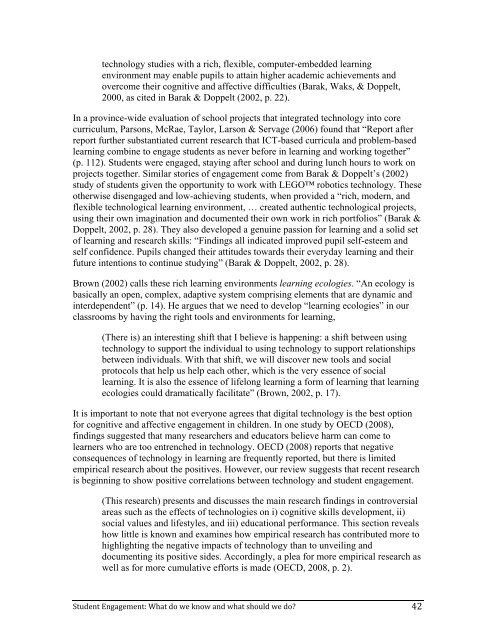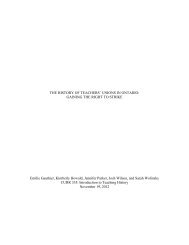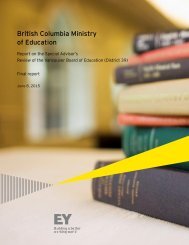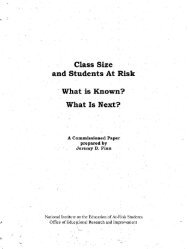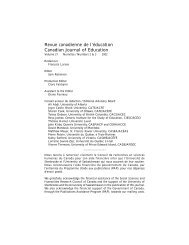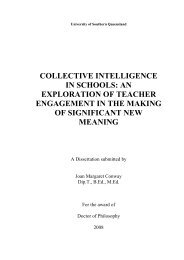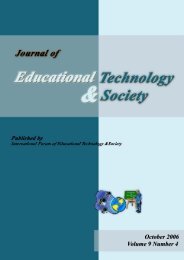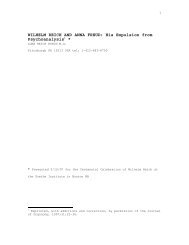Student Engagement: What do we know and what should we do?
Student Engagement: What do we know and what should we do?
Student Engagement: What do we know and what should we do?
Create successful ePaper yourself
Turn your PDF publications into a flip-book with our unique Google optimized e-Paper software.
technology studies with a rich, flexible, computer-embedded learning<br />
environment may enable pupils to attain higher academic achievements <strong>and</strong><br />
overcome their cognitive <strong>and</strong> affective difficulties (Barak, Waks, & Doppelt,<br />
2000, as cited in Barak & Doppelt (2002, p. 22).<br />
In a province-wide evaluation of school projects that integrated technology into core<br />
curriculum, Parsons, McRae, Taylor, Larson & Servage (2006) found that “Report after<br />
report further substantiated current research that ICT-based curricula <strong>and</strong> problem-based<br />
learning combine to engage students as never before in learning <strong>and</strong> working together”<br />
(p. 112). <strong>Student</strong>s <strong>we</strong>re engaged, staying after school <strong>and</strong> during lunch hours to work on<br />
projects together. Similar stories of engagement come from Barak & Doppelt’s (2002)<br />
study of students given the opportunity to work with LEGO robotics technology. These<br />
otherwise disengaged <strong>and</strong> low-achieving students, when provided a “rich, modern, <strong>and</strong><br />
flexible technological learning environment, … created authentic technological projects,<br />
using their own imagination <strong>and</strong> <strong>do</strong>cumented their own work in rich portfolios” (Barak &<br />
Doppelt, 2002, p. 28). They also developed a genuine passion for learning <strong>and</strong> a solid set<br />
of learning <strong>and</strong> research skills: “Findings all indicated improved pupil self-esteem <strong>and</strong><br />
self confidence. Pupils changed their attitudes towards their everyday learning <strong>and</strong> their<br />
future intentions to continue studying” (Barak & Doppelt, 2002, p. 28).<br />
Brown (2002) calls these rich learning environments learning ecologies. “An ecology is<br />
basically an open, complex, adaptive system comprising elements that are dynamic <strong>and</strong><br />
interdependent” (p. 14). He argues that <strong>we</strong> need to develop “learning ecologies” in our<br />
classrooms by having the right tools <strong>and</strong> environments for learning,<br />
(There is) an interesting shift that I believe is happening: a shift bet<strong>we</strong>en using<br />
technology to support the individual to using technology to support relationships<br />
bet<strong>we</strong>en individuals. With that shift, <strong>we</strong> will discover new tools <strong>and</strong> social<br />
protocols that help us help each other, which is the very essence of social<br />
learning. It is also the essence of lifelong learning a form of learning that learning<br />
ecologies could dramatically facilitate” (Brown, 2002, p. 17).<br />
It is important to note that not everyone agrees that digital technology is the best option<br />
for cognitive <strong>and</strong> affective engagement in children. In one study by OECD (2008),<br />
findings suggested that many researchers <strong>and</strong> educators believe harm can come to<br />
learners who are too entrenched in technology. OECD (2008) reports that negative<br />
consequences of technology in learning are frequently reported, but there is limited<br />
empirical research about the positives. Ho<strong>we</strong>ver, our review suggests that recent research<br />
is beginning to show positive correlations bet<strong>we</strong>en technology <strong>and</strong> student engagement.<br />
(This research) presents <strong>and</strong> discusses the main research findings in controversial<br />
areas such as the effects of technologies on i) cognitive skills development, ii)<br />
social values <strong>and</strong> lifestyles, <strong>and</strong> iii) educational performance. This section reveals<br />
how little is <strong>know</strong>n <strong>and</strong> examines how empirical research has contributed more to<br />
highlighting the negative impacts of technology than to unveiling <strong>and</strong><br />
<strong>do</strong>cumenting its positive sides. Accordingly, a plea for more empirical research as<br />
<strong>we</strong>ll as for more cumulative efforts is made (OECD, 2008, p. 2).<br />
<strong>Student</strong> <strong>Engagement</strong>: <strong>What</strong> <strong>do</strong> <strong>we</strong> <strong>know</strong> <strong>and</strong> <strong>what</strong> <strong>should</strong> <strong>we</strong> <strong>do</strong>? 42


